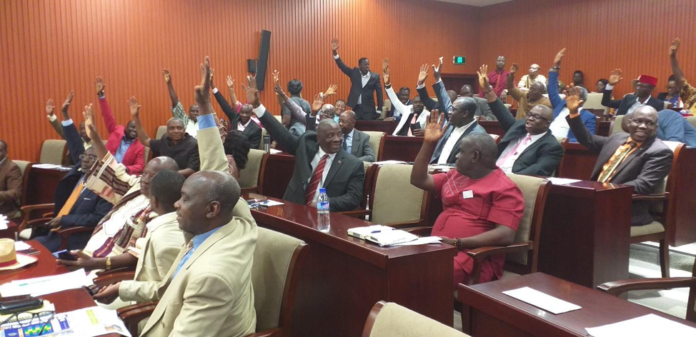After more than four years of struggle, plenary of the House of Representatives has voted to pass into law the Domestic Violence Bill.
The bill which among other things seeks tighter punishment for perpetrators of domestic violence and protection for victims/survivors was finally passed by the house on Thursday July 4, 2019.
It follows a sustained debate on the floor that culminated with a motion proffered by Rep. Edwin M. Snowe (Bomi County District #1).
Rep. Snowe craved the indulgence of his colleagues to pass the bill, titled the Domestic Violence Bill of 2019, into law to be sent to the Senate for concurrence. The motion was carried with 41 lawmakers voting in favor, and none against and one (Rep. Isaac Roland) abstained.
It was expected that the bill would have been passed by the House of Representatives on Tuesday, July 2, 2019, following the submission of a revised version by the Joint Committee on Judiciary, Good Governance, and Gender Equity & Social Protection.
Despite the presence of several gender campaigners led by the Minister of Gender, Children and Social Protection, Williametta Piso Saydee-Tarr, the United States Ambassador accredited to Liberia, Christine Elder and representatives of the Swedish Embassy accredited near Liberia, the bill could not be passed as lawmakers called for more time to peruse the document.
Following a sustained debate on the floor, plenary voted in favor of a motion for reconsideration proffered by Rep. Acarous M. Gray (Montserrado Co. Dist. #8), requesting the joint committee to resubmit the bill on Thursday, July 4, 2019 for further debate and possible passage at which time lawmakers would have had ample time for perusal.
However, some lawmakers attempted to stall its passage, requesting for more time to review and consult their constituents.
Reps. Francis Sakila Nyumalin (Lofa County District #1) and Dr. Isaac Blalu Roland (Maryland Co. Dist. #3) had earlier called for more time and explanation on some of the terminologies including the definitions of emotional, verbal and psychological abuse as defined in the bill.
The bill defines domestic violence as “any act of violence that results in, or is likely to result in physical, sexual or psychological harm or suffering to women, men, or children, including threats of such acts, coercion or arbitrary deprivation of liberty, whether occurring in public or in private life between parties in an existing or former domestic relationship.”
Emotional, verbal and psychological abuse as stated in the bill is defined as “a pattern or one time occurrence of degrading or humiliating conduct towards a person including any behavior that causes emotional damage and reduction of self-esteem, or that harms and disturbs full development, or that aims at degrading or controlling a person’s action, behavior, beliefs and decisions, by means of reduction of self-esteem, threat, embarrassment, humiliation, manipulation isolation, constant surveillance, constant pursuit, insult, intimidations, blackmail, ridiculing, exploitation and limitation of the rights to come and go, repeated exhibition of obsessive possessiveness or jealousy, which is such as to constitute a serious invasion of a person’s privacy, liberty, integrity or security, or any other acts that cause damage to the person’s psychological health and self-determination or any series of acts which collectively cause a person to fear for his or her safety and life.”
Rep. Nyumalin asked for more clarity on the definition and cautioned his colleagues to review the bill thoroughly to avoid future problems as people may misuse the provisions.
The Chairman of the Judicial Committee, Rep. Fonati Koffa clarified that the bill provides that emotional, verbal and psychological abuse should be determined by medical personnel or behavioral experts and not based on mere accusations.
5 years struggle at the legislature
The bill was first introduced as the Domestic Violence Act of 2014 as an upgraded version of the Liberian domestic violence laws as contained in Chapter 16 of the penal code.
The first version stalled at the Legislature because it criminalized Female Genital Mutilation (FGM), a traditional practice that has been universally recognized as a violent and inhumane act.
FGM has been a contentious issue as the practice is a core aspect of Liberia’s sacred traditional female school, the Sande Society.
For fear of a political backlash of the traditional groups, previous sponsors [lawmakers] could not muster sufficient support in the Legislature to ban the practice. As a result, the passage of Domestic Violence bill continues to stall at the Legislature since its introduction in 2014.






















